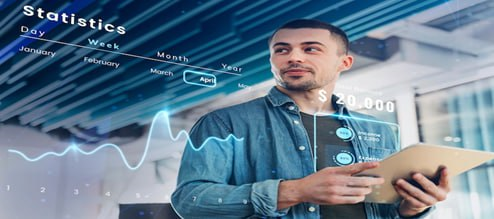AI in Financial Markets: Revolutionizing Trading in Real Time
The early 1990s marked the introduction of computational finance which focused on applying Artificial Intelligence (AI) to financial investments in the stock market. It currently extends to three broad areas of finance including the optimization of financial portfolios, prediction of future prices or trends in financial assets, and sentiment analysis of news or social media comments about the assets or companies. The main advantages of using computational approaches to automate the financial investment process include the elimination of momentary irrationality resulting from decision-making based on emotions, the ability to recognize and explore patterns that are looked over by humans, and the immediate consumption of information in real-time.
The scope of computational finance has also been researched in the control of dynamic systems applied to the financial market, investor behavioral analysis, network analysis, and clustering of financial assets.

Stock market prediction or forecasting using historical time series has become a technique widely used by researchers and investors to obtain financial profits in stock trading. These predictions, initially carried out by statistical methods, have been increasingly performed by artificial intelligence algorithms in recent times.
Ways in which AI is Reshaping Investment Landscape
Provide accurate analysis of financial data in real-time
AI algorithms process vast amounts of financial data in real-time which enables the investors to make data-driven decisions, whereas traditional stock analysis makes it difficult to capture and interpret the sheer volume of information. Thus the use of AI efficiently grabs opportunities when traditional stock trading can lead to potential missed opportunities or faulty judgments.
AI systems can efficiently detect fraud thus managing the risk
AI-powered systems in the stock market are increasingly being used in risk management and fraud detection. They can potentially identify unusual trading patterns detect market manipulations and recognize fraudulent activities. AI systems can monitor vast amounts of data and flag suspicious activities in real time. This helps regulators and market participants maintain market integrity and investor confidence.
Enable the access of advanced investment strategies to retail participants
Initially, only the hedge fund traders and institutional investors had access to investment strategies and advanced techniques. However, AI-driven investment platforms have brought these strategies within the reach of retail investors. They support the creation of personalized investment portfolios based on individual risk tolerance, financial goals, and market conditions.
Helpful in tapping data across different types of sources
AI applications can identify new patterns and predict potential price movements of specific products or asset classes. These applications not only track market movements but also study data from non-traditional sources like social media and satellite imagery, to predict economic activities and identify price movements. Some broker-dealers who are also investment advisors aim to incorporate these predictions into their investment strategies to generate alpha for the portfolio.
Facilitates pre-trade analysis and trade execution
Algo-trading uses past stock and market data to predict future asset returns and serves as a good source of pre-trade technical analysis. Additionally, it can also be used in fundamental analysis. Another essential part of pre-trade analysis is the computation and analysis of transaction costs. It helps to determine whether the costs of trading are small enough for a trading signal to generate profits net of implementation costs. Executing large trades often involves significant market impact costs, thus these are broken up into a sequence of smaller orders, which are easier and cheaper to execute. AI helps in the formulation of execution strategies that time and size the smaller model.
Robo-advisors provide customized advice to individual investors

Robo-advisors are computer programs that provide customized advice to assist individual investors in investment activities. These integrate portfolio management and trading as per the investor’s risk appetite. Additionally, they rebalance portfolios and minimize transaction costs as they have an integrated trade execution service. Further, they are less expensive than human advisors and provide a simple interface making them more accessible for retail investors. They are also less prone to behavioral biases, mistakes, and illegal practices and can efficiently process a wide range of financial data.
Applications of AI Algorithms in Trading
KNN algorithm can be used for stock classification
KNN algorithm can be used for stock classification through P/E ratio analysis and corporate strategy identification. The P/E ratio analysis is done by training the algorithm with the inputs (such as P/E ratio, dividend rate, and classification label) of blue-chip stocks and high-growth stocks. The new stock is classified by using the training results of the KNN. The corporate strategies can be classified into low-cost strategy, differentiation strategy, and any other strategy used by the company. These strategies are primarily dependent on the fixed asset turnover rate and gross profit margins. The KNN algorithm determines the strategies used based on these variables.
Weka and K-mean algorithms can be used to cluster index data through effective data mining
Weka algorithm has been tested to provide a graphical user interface to provide clusterization of the NSE data. It offers various features to analyze the NSE dataset for intraday trading. Comparatively, k-means is the best algorithm attributed to its simplicity and speedy results over other algorithms. It is also suitable for stock market data mining applications and is more sensitive to outliers. Clustering is helpful in predicting the value of stocks to decide on future investments.
ANN algorithms are helpful in the determination of transaction costs for pre-trade analysis
Transaction costs are evaluated on three main components namely, bid–ask spreads, market impact costs, and trading commissions. Market impact cost is most important for transaction cost analysis, as it studies the adverse effect of trade on market prices and is not observable before the trade is initiated. AI approaches complement traditional market impact models by providing additional insights. ANN algorithms are useful in predicting the market impact of a market. The Bayesian network model is another approach that estimates market impact while providing intuition on the main drivers. This approach accounts for variables with data availability issues.
The Rise of Algorithm Trading
Algorithmic trading popularly known as algo-trading is a systematic approach to buying or selling in financial markets, employing a predetermined set of rules and processes. These rules and processes are designed to trigger trade executions based on specific conditions or triggers.

Algo-trading has the potential to generate profits at a speed and rate that is not possible for a human trader but requires due diligence on the part of the trader. This involves defining a trading strategy, setting parameters, and monitoring the system regularly to ensure profits and avoid losses. This is done by changing variables such as frequency, volumes, and limits. These changes are subject to the utilization of historical data which provide reliable predictions of future market trends. The proper management of algo trading leads to more accurate and right trades that are automatically executed with mitigated risk. This also checks the rash decisions on the part of the investors which are normally based on emotion rather than logic. Emotions come into play when the investors are trading large amounts of funds and fear of losing them.
The drawback of algo-trading is the occurrence of black-swan events such as COVID-19 which lead to market disruptions. So, in case of sole reliance on algo-trading it is advisable to seek out the help of a qualified financial advisor who possesses the technical know-how and expertise and has the caliber to generate alpha. Also, though algo-trading automates many processes, it can still be complicated and expensive to set up.
The strategies used in algorithmic trading are primarily based on technical analysis. Although performing fundamental analysis is also possible considering trading is a high-frequency activity it makes fundamentals analysis less effective. Modern technical analysis also incorporates information from other sources, including fund flows, investor trades, and textual data from news articles or online sources. AI techniques using NLP can be particularly useful with respect to these new, unstructured sources of data.
Challenges to Incorporating AI in Trading
AI would be unable to predict black-swan events and AI can potentially generate some
AI models would be ineffective towards unusual market volatility that occurs as a result of unexpected events known as black swan events such as natural disasters, pandemics, or geopolitical changes. This will not only affect the predictions but can also trigger undesired trading behavior resulting in negative consequences as the market crashes. Some industry participants are suspicious of AI trading models across the industry to learn from each other which will potentially lead to collusive activity, herd behavior, and thus unpredictable results.
Ineffective estimation of market impact by nonparametric techniques
Although nonparametric techniques estimate market impact they suffer from two major shortcomings. The majority of these techniques do not have economic intuition for the drivers of price impact. Thus, at times they capture noise for relevant information. Additionally, these techniques cannot distinguish between permanent and temporary market impact. To address these two issues, a parametric approach such as LASSO regression is used alongside nonparametric techniques.
Comprehension of inferences from AI models is rather difficult

At times understanding the inferences made by AI models is difficult. This can render human supervision ineffective. Even in the absence of major events, AI algorithms may make the same errors at the same time, introducing the risk of cascading market crashes. To better understand the behavior of AI models, some people approximate an AI model’s prediction while also constructing an additional, simpler, and interpretable surrogate model.
AI can make wrong decisions based on incorrect inferences
Data quality and sufficiency can affect the inferences thus resulting in wrong decision making. This becomes all the more important because AI outputs are often taken at face value. Furthermore, AI models require large amounts of data during the learning phase, which is more likely to be unavailable. This lack of data might lead to improper calibration. Also, the availability of a short time series of financial data can considerably affect future predictions.
The practical applications of AI systems can be expensive
The efficient working of AI systems requires significant investment in software, hardware, human resources, and data systems. These compete with the budget of mutually exclusive research projects. Once the AI hype has dissipated, investors might lose interest in AI-driven funds, which would make investments in AI infrastructure even harder.
In a nutshell, AI has diverse applications in portfolio management, trading, and portfolio risk management. It also serves at the heart of new practices and activities, such as algorithmic trading and robo-advising. Yet, it is still not capable of replacing humans completely. Thus, it can be said that the present role of AI in financial markets is to partly address the issues of portfolio optimization. However, AI technologies still need to be worked upon to be capable of developing fully automated algorithmic trading systems. Thus, asset managers need to be mindful when working with AI systems and timely validate AI outcomes with self-calculations and discretions. Additionally, individual investors should not abstain from human advisory and rather use AI systems in collaboration with their financial advisors.